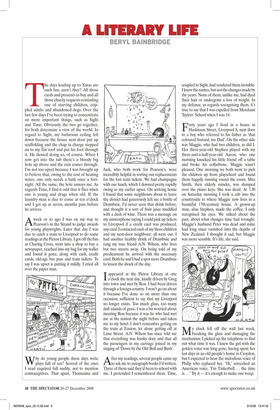T he days leading up to Xmas are such fun, aren’t
they? All those cards and presents to buy and all those charity requests reminding one of starving children, crippled adults and abandoned dogs. Over the last few days I’ve been trying to concentrate on more important things, such as Sight and Time. Obviously the two go together, for both determine a view of the world. In regard to Sight, my bathroom ceiling fell down because the house next door put up scaffolding and the chap in charge stepped on to my flat roof and put his foot through it. He denied doing so, of course. When I now get into the tub there’s a bloody big hole up above and the rain comes through. I’m not too upset because I was brought up to believe that, owing to the cost of heating water, one only needs a bath once a fortnight. All the same, the hole annoys me. As regards Time, I find it odd that it flies when one is young and drags when old. If the laundry man is due to come at ten o’clock and I get up at seven, months pass before he arrives.
Aweek or so ago I was on my way to Pearson’s in the Strand to judge awards for young playwrights. Later that day I was due to catch a train to Liverpool to do some readings at the Picton Library. I got off the bus at Charing Cross, went into a shop to buy a newspaper, reached into my bag for my wallet and found it gone, along with cash, credit cards, old-age bus pass and train tickets. To say I was upset is putting it mildly. I cried all over the paper man.
Why do young people these days write plays full of sex? Several of the ones I read required full nudity, not to mention contraceptives. That apart, Thomasina and Jack, who both work for Pearson’s, were incredibly helpful in sorting out replacements for the lost train tickets. We had champagne with our lunch, which I downed pretty rapidly owing to my earlier upset. On arriving home I found that some neighbours about to leave the district had generously left me a bottle of Drambuie. I’d never seen that drink before, and thought it a sort of fruit juice muddled with a dash of wine. There was a message on my answerphone saying I could pick up tickets to Liverpool if a credit card was produced, any card. I contacted each of my three children and my next-door neighbour; all were out. I had another healthy drink of Drambuie and rang my true friend A.N. Wilson, who lives but two streets away. On being told of my predicament he arrived with the necessary card. Both he and I had a spot more Drambuie to lessen the shock of the day.
Iappeared at the Picton Library at one o’clock the next day, kindly driven by Greg into town and met by Ron. I had been driven through a foreign country. I won’t go on about it because I’ve done so on more than one occasion; sufficient to say that my Liverpool no longer exists. Too much glass, too many daft islands of grass. I was a bit worried about meeting Ron because it was he who had met me at the station the night before and taken me to my hotel. I don’t remember getting on the train at Euston, let alone getting off at Lime Street. A.N. Wilson has since told me that everything was hunky dory and that all the passengers in my carriage joined in my singing of ‘Down by the Old Bull and Bush’.
After my readings, several people came up to ask me to autograph books I’d written. Three of them said they’d been to school with me. I pretended I remembered them. Time, coupled to Sight, had rendered them invisible. I knew the names, but not the changes made by the years. None of them, unlike me, had dyed their hair or undergone a loss of weight. In my defence, as regards recognising them, it’s true to say that I was expelled from Merchant Taylors’ School when I was 14.
Forty years ago I lived in a house in Huskisson Street, Liverpool 8, next door to a boy who referred to his father as ‘that coloured bastard, me Dad’. On the other side was Maggie, who had two children, as did I. Her three-year-old Stephen played with my three-and-a-half-year-old Aaron, who one morning knocked his little friend off a table and broke his collarbone. Maggie wasn’t pleased. One morning we both went to pick the children up from playschool and found them happily running round the room. Miss Smith, their elderly minder, was slumped over the piano keys. She was dead. At 7.30 on Saturday morning I took a cab into the countryside to where Maggie now lives in a beautiful 17th-century house. A grown-up man, alias Stephen, made the coffee. I only recognised his eyes. We talked about the past, about what changes time had wrought. Maggie’s husband Peter was dead and mine had long since vanished into the depths of New Zealand. I thought it sad, but Maggie was more sensible. It’s life, she said.
My clock fell off the wall last week, breaking the glass and damaging the mechanism. I picked up the telephone to find out what time it was. I knew the girl with the golden voice was long gone, having spent her last days in an old people’s home in Croydon, but I expected to hear the melodious voice of Philip who replaced her. ‘Hi,’ screeched an American voice. ‘I’m Tinkerbell ... the time is... ’ Try it — it’s enough to make one weep.






















































































































 Previous page
Previous page